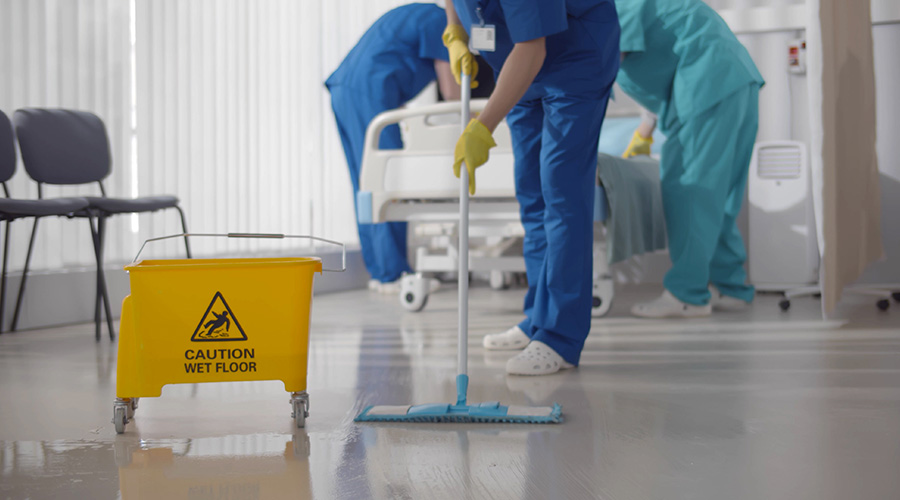Healthcare facilities can be notoriously noisy, which only adds to the stress of healthcare staff. However, proper acoustics may be able to help reduce the noise level staff experience. In this manufacturer roundtable, Healthcare Facilities Today speaks with acoustics manufacturers about how proper acoustics can reduce stress and increase productivity for healthcare staff.
How do acoustics reduce stress and increase productivity for healthcare staff?
“Hospitals and healthcare facilities require cleanable surfaces which tend to be hard materials that bounce noise. Noise can create distraction and elevated levels of stress due to increased sensory input. By controlling noise within these spaces, healthcare staff would find themselves in a more pleasant environment – allowing them to focus and concentrate on the needs of the patients and staff.”
— David Smith, chief operating officer, Lencore
“Noise is a top complaint in many workplaces—and healthcare environments are no different. Effective acoustical design assists staff in performing a difficult and stressful job. When good acoustics lead to improved patient satisfaction and outcomes, staff benefit due to elevated patient mood and reduced care needs—even reduced calls for pain medication. They also expend less effort attempting to overcome this constant environmental stimulus, which otherwise causes cognitive strain and stress, contributing to anxiety and burnout. Of course, it’s also important to remember that disruptive noise isn’t just uncomfortable and fatiguing for employees—it can also lead to critical mistakes, such as if medication requirements are misheard. Staff also have an obligation to ensure a HIPAA-mandated level of speech privacy when communicating any personally identifiable healthcare information. An environment designed for enhanced acoustic privacy using a balanced combination of sound masking, absorption and physical barriers will ease such communication and reduce the organization’s risk of noncompliance penalties. Basically, addressing acoustical issues supports professional and proficient delivery of care.”
— Niklas Moeller, vice president, LogiSon Acoustic Network
“Good acoustics can benefit both clinical and nonclinical staff just as much as patients. Noise impacts nurses’ physiology, too. Some healthcare staff work long shifts for many days in a row. They sleep when they can inside the hospital. Their sleep deprivation can make accurate communication more difficult. The CHD recommends installing high-performance sound absorption, especially on the ceiling, to “reduce staff stress.”
According to CHD: “At least three studies have shown that installing high-performance sound-absorbing ceiling tiles and panels results in reduced noise levels and perceptions of noise and impacts other outcomes such as improved speech intelligibility and reduced perceived work pressure among staff.”
— Gary Madaras, PhD, acoustic specialist, Rockfon
“Healthcare facilities are notorious for loud, unusually low-pitched or high-pitched and/or repetitive noises: think patient monitors, announcements made over the public address system (PA system), and more. When these disruptive sounds are coupled with hard surfaces like glass or tile flooring, they can be reflected and magnified, negatively affecting the welfare, focus and comfort of healthcare staff.
Acoustic issues can be dramatically reduced with the introduction of acoustic products. By offsetting the ratio between hard and soft materials, sound quality is improved; sound waves become “trapped” in sound-absorbing materials, thereby reducing unwanted reverberation. The diminishment of reverberation decreases overall noise volume, improves sound quality and provides a level of privacy – an important consideration in healthcare settings. Notably, having a more acoustically pleasant workplace can bring down stress and increase focus – an important consideration to improve worker productivity and, moreover, patient care.”
— Michael Ackelbein, vice president of sales, Fräsch
“Having acoustically sound workspaces benefit healthcare staff as they allow for improved communication and attention to detail – both of which make a difference in the care provided. Modernfold’s operable partitions can help address both of those needs. In addition, as hospitals continue to work to address their lack of surge capacity for in-patient needs, operable walls present an option to help with flexible space solutions that work well for both the healthcare system, their patients, and their employees.”
— Bryan Welch, managing director, Modernfold
Jeff Wardon, Jr. is the assistant editor for the facilities market.

 Building Sustainable Healthcare for an Aging Population
Building Sustainable Healthcare for an Aging Population Froedtert ThedaCare Announces Opening of ThedaCare Medical Center-Oshkosh
Froedtert ThedaCare Announces Opening of ThedaCare Medical Center-Oshkosh Touchmark Acquires The Hacienda at Georgetown Senior Living Facility
Touchmark Acquires The Hacienda at Georgetown Senior Living Facility Contaminants Under Foot: A Closer Look at Patient Room Floors
Contaminants Under Foot: A Closer Look at Patient Room Floors Power Outages Largely Driven by Extreme Weather Events
Power Outages Largely Driven by Extreme Weather Events